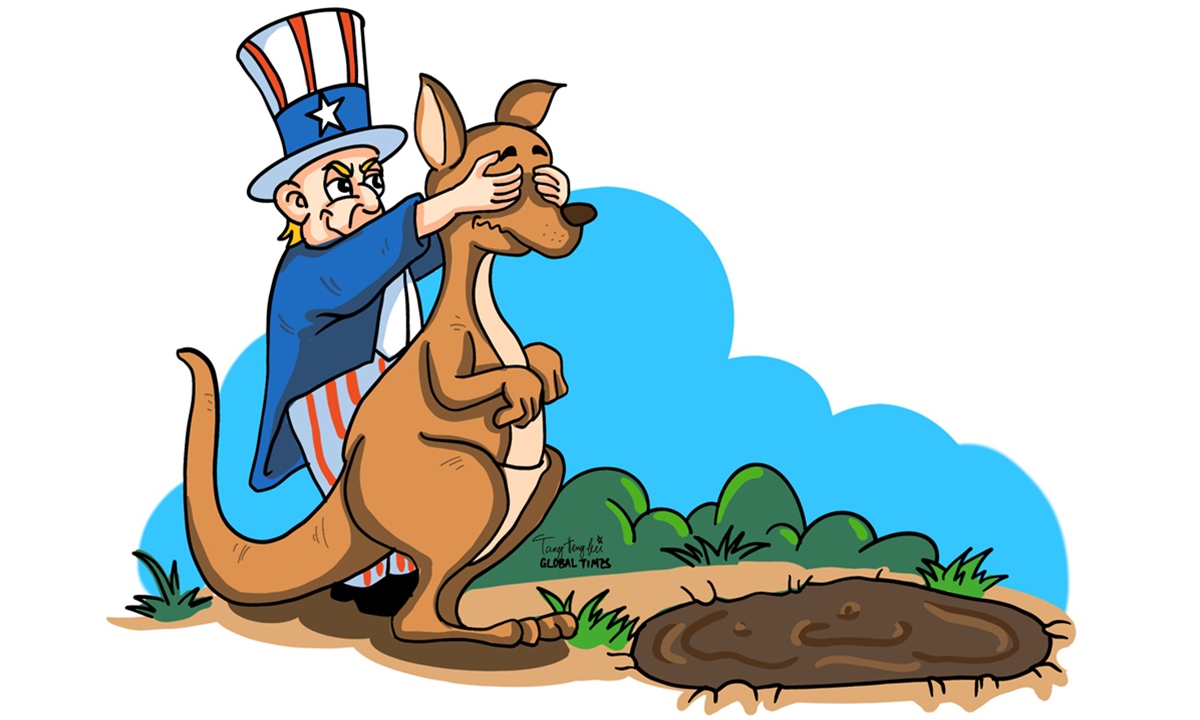Has Australia misjudged US capability to interfere in Asia?
By Xu Shanpin Source: Global Times Published: 2020/12/3 15:13:40

Illustration: Tang Tengfei/GT
The US has always played a central role in Australia's diplomatic and national defense strategy. This is because of Australian's long-standing belief that their country's security depends on alliances.
Due to its limited strength, Australia has relied heavily on its ally, namely the US, in terms of geo-security. In the mean time, Australia's role in US global strategic layout has been inconspicuous. Canberra is thus afraid it one day might be abandoned by Washington. Such concerns have risen sharply amid the strategic contraction conducted by US President Donald Trump.
Australia's strength is far weaker than that of the US in terms of security, and it is also economically dependent on the Chinese market. Compared with the US, Australia senses unprecedented fear and anxiety about Chinese elements, influence, capital and even Chinese faces on its territory.
Therefore, the country is more vigilant about China and feels more urgent to check and balance China. There was even a time when Australia stood at the frontlines of anti-China policies for the US to confront China.
Due to fears of being abandoned by Washington or the potential weakening of the Australia-US alliance in the future, Canberra has to demonstrate its strategic value and loyalty to the US. Therefore, it will amplify aggressive messages in order to garnish US support with its initiative to counterbalance China. This helps explain why Australian Prime Minister Scott Morrison is making a dangerously high bet on the US and this has seriously damaged China-Australia relations.
But Morrison seems to be leading the relationship astray. It is fast moving from a win-win situation to a lose-lose one. Australia will be the one who loses more.
In the initial stage of the diplomatic confrontation between Beijing and Canberra, Morrison apparently prioritized ideology instead of national interests. Such acts greatly reduced the wiggle room within China-Australia relations. It lost valuable diplomatic flexibility. Morrison clearly underestimated China's determination to defend its national interests and sovereignty. He underestimated the dependence of Australia's domestic market on the Chinese economy, but overestimated the possible diplomatic and strategic support that the US might provide to Australia.
China does not need an arrogant and rude friend like Australia. Beijing has never seen Canberra's insolence as "outspoken," nor has Australia's condescending preaching been received as "friendly advice."
Although the incoming Biden administration has not stated a clear China policy, Australia is playing a proactive role in containing China in a bid to lead its alliance with the US in an indirect way from the beginning. Therefore, Canberra expects it can shape the agenda and functions of the US-Australia alliance. Australia's moves are actively designed to counter China. Canberra repeatedly seeks to upgrade the US-Australia alliance in order to ensure Washington does not leave it out in the cold. It also signals Canberra's calculated intent to ramp up its capabilities with further agenda-setting and bargaining under the framework of US-Australia alliance.
Due to the widening gap of national strength between China and Australia and the declining role of the US strategic capability and credibility, Australia knows it will have to be set on the back-burner as Beijing and Washington sort out their priorities with one another.
Canberra's premature and hasty siding with Washington amid the great-power game with China not only failed to boost its international status and extend its diplomatic space, but also has been counterattacked by Beijing. Indeed, it failed to receive Washington's pivotal strategic support.
With the ever evolving international situation, China will not continue to allow Australia to enjoy China's economic dividends while groundlessly criticizing China at international stage at the same time.
Constrained by the polarization of domestic politics, social divisions and rocketing deficits, the incoming Biden administration will place much of its focus on amending social confrontations and reviving the US economy. The US strategy in the Asia-Pacific region will rely more on support from its Asia-Pacific allies, with limited strategic support dedicated to Australia. Taking sides with the US over China has cost Australia valuable diplomatic flexibility. Australia has been smashed between two rocks instead of milking both sides.
When the Biden administration comes in, the Morrison administration may continue to adopt a confrontational approach regarding China in a bid to influence the Biden team's China policy and the future direction of US-Australia alliance. In order to prevent the alliance from getting weak, Australia may take the initiative to endow the alliance with a greater role to counterbalance China, making the alliance not only serve US interests but also Australia's ambitions.
In the future, China-US relations might be better than China-Australia relations. Therefore, China and the US need to seriously think about how to deal with the "third factor" in their bilateral ties in order to avoid sliding toward unnecessary conflicts and confrontation.
The author is an adjunct researcher at the Center for Australian Studies, China University of Mining and Technology. opinion@globaltimes.com.cn
Posted in: VIEWPOINT,ASIAN REVIEW,OTHER REGIONS